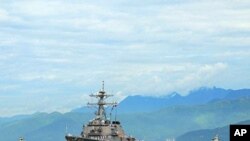U.S. Defense Secretary Robert Gates visits Vietnam next week to continue the development of a 15-year relationship that has expanded into the defense domain. A senior U.S. official says the two countries have agreed on four areas of defense cooperation to carry the relationship forward.
Defense Secretary Gates' visit follows a series of events to mark the 15th anniversary of the establishment of U.S.-Vietnamese diplomatic relations - including joint military exercises, a visit to Vietnam by a U.S. Navy ship and a trip to Hawaii by Vietnam's defense minister, General Phung Quang Thanh.
To help prepare for the Gates trip, Deputy Assistant Secretary of Defense Robert Scher went to Hanoi in August for what he calls the first talks between policy-making officials of the two defense departments. He says the talks identified four key areas for defense cooperation - peacekeeping, search and rescue, disaster relief and maritime security.
Pentagon Press Secretary Geoff Morrell says in Hanoi Gates will talk about all those topics with his hosts, and also the joint effort to establish "the fullest possible accounting of Americans missing from the Vietnam conflict." Morrell called Vietnam a "close" and "leading" U.S. partner in Southeast Asia.
"That Vietnam has become one of our leading partners in the region reflects how far we have come in the 15 years since the normalization of U.S.-Vietnam relations," he said.
More immediate issues may also come up at the talks, as Robert Sher says they did during his visit, including territorial disputes in the South China Sea and the rising influence of China in the region as it continues annual double-digit increases in its defense budget.
"You have to look at Chinese military modernization as part of the broader trends of a lot of military modernization throughout the region," said Sher. "And it cannot be taken in isolation and it needs to be looked at in that broader context. [And] it is not just capabilities that we need to look at. It is actually what are they doing it for."
While in Hanoi, Secretary Gates is expected to hold his first meeting with his Chinese counterpart in more than a year. China froze defense relations with the United States following the latest U.S. arms sale to Taiwan in January.
Gates will also be in meetings with the defense minister of Russia, which is reported to be planning to refurbish and use the military base at Vietnam's Cam Ranh Bay. The United States used the base during the Vietnam War, and Russia used it for more than two decades afterwards, until 2002.
The Gates visit to Hanoi will also deal with regional issues at a meeting of Southeast Asian defense ministers with their counterparts from China, Russia the United States and five other countries.
Likely on the agenda are the territorial disputes in the South China Sea involving Vietnam, China and the Philippines among others. These are long-standing disputes, but China has become more active in trying to assert what it sees as its rights to a series of small islands, and to the self-declared 12-mile exclusive economic zone all around its coast.
Robert Scher says top U.S. officials have made clear they want the disputes resolved peacefully.
"We in the United States believe that it is very important that the nations of the region, and especially the claimant states in the South China Sea are able to resolve these disputes peacefully, in accordance with international law and international norms of behavior," he said.
At a July meeting in Hanoi, Secretary of State Hillary Clinton called the peaceful resolution of the South China Sea disputes a "national interest" of the United States. That comment drew criticism from China, which called it an "attack," and said only claimant countries should be involved in resolving the disputes.
That exchange is emblematic of China's new assertiveness as it uses its increased economic and military power to pursue its interests. Indeed, a Chinese admiral suggested a few years ago that the U.S. and Chinese navies divide the Pacific into spheres of influence, with the International Dateline as the boundary, a suggestion his American counterpart immediately rejected.
Robert Scher said the United States intends to remain a power in Asia.
"We still believe it is crucially in our interest to remain engaged in Asia, to remain, with partners and friends, achieving common interests in Asia," he said. "And we intend to use the military tools at our disposal, along with the diplomatic and economic tools, to ensure that we continue to have that role in Asia."
Scher says one U.S. priority is to ensure the free flow of people and goods through international waters in Asia. He says countries in the region have "grown and prospered" through decades of American presence, and the United States plans for that to continue.




